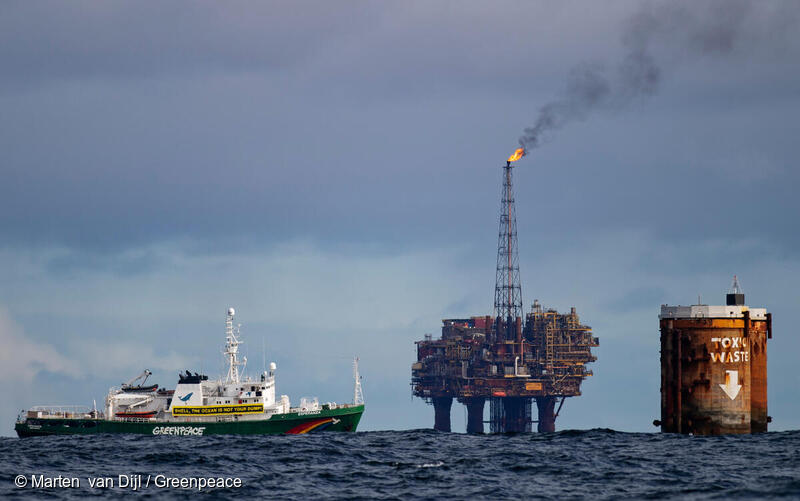ECB’s purchasing policies skewed towards carbon-intensive industries – report
Brussels/Frankfurt – A new report [1] reveals how the ECB’s proclaimed “market neutrality” policy actually skews the bank’s corporate bond purchases in favor of carbon intensive industries. Decarbonising Is Easy: Beyond Market Neutrality in the ECB’s Corporate QE was published by the New Economics Foundation, SOAS University of London, the University of the West of England, the University of Greenwich and Greenpeace Central and Eastern Europe.
The analysis, which proposes two low-carbon alternative scenarios, comes on the back of comments by Christine Lagarde last week questioning market neutrality in the light of the climate crisis and was published on the eve of an ECB meeting with civil society representatives to discuss the review of the bank’s policies, including its monetary guidelines.
The new report shows that more than half of the €241.6 billion in corporate bonds held by the ECB at the end of July 2020 have been issued by companies in carbon-intensive sectors, which contribute significantly to the EU’s emissions and further fuel the climate crisis. The new research reveals how the ECB’s “market neutrality” policy leads to a significant carbon bias in bond purchases. The ECB holds bonds from many of the EU’s worst emitters, including Total, Shell, OMV and Eni. The analysis also indicates that 62.7% of the bonds held by the ECB come from carbon-intensive sectors that contribute only 17.8% to employment and 29.1% to gross value added in the Euro area.
“It’s time to stop hiding behind so-called neutrality and start taking into account the impact of our choices on each other and the planet. The European Central Bank must reject bonds from companies that are wrecking the climate, especially given their underperformance in employment and economic value for European communities. The bank’s governing council must adapt its monetary policy, stop buying bonds from big polluters, and support the transition to a green and just world,” said Jennifer Morgan, Executive Director, Greenpeace International.

The researchers propose two policy scenarios the ECB could adopt to support the transition to renewable energy and tackle the climate emergency. In the “lower-carbon” scenario, the ECB stops buying all bonds issued by fossil-fuel companies and by other carbon-intensive companies. Instead, it buys more bonds issued by companies with a lower carbon footprint. In the “low-carbon” scenario, all the bonds issued by carbon-intensive companies are removed from the ECB’s portfolio and more non-carbon-intensive bonds are added, by relaxing the bank’s eligibility criteria, such as dropping the requirement for bonds to have an investment grade rating. Both scenarios would increase the number and value of bonds the ECB purchases, and would therefore be in line with the supportive economic role the ECB is playing during the pandemic.
“The ECB’s corporate QE programme is laced with a carbon bias, whereby it is actively lowering the cost of borrowing (an implicit subsidy) and encouraging more debt issuance by the most carbon intensive companies compared to low-carbon ones. This puts the ECB at odds with the environmental goals of democratically elected officials, and effectively undermines the Paris Climate Agreement, which the ECB is party to. To help build back better and create a financial climate that is supportive of a green deal, we have come up with a framework that will propel investments that are genuinely supportive of a green and resilient recovery,” said Miatta Fahnbulleh, CEO of the New Economics Foundation.
“Since 2016 the ECB corporate QE programme has supported a large number of highly polluting companies. This is the result of the application of the market neutrality principle, which the ECB itself has started recognising as problematic in the age of climate emergency. It is now time for Europe’s most powerful financial institution to decarbonise its QE programme and contribute to our collective effort for a rapid transition to a low-carbon economy. Our data analysis shows how this can be done,” said Yannis Dafermos, lecturer in economics, SOAS University of London.
– ends –
Notes:
[1] Decarbonising Is Easy: Beyond Market Neutrality in the ECB’s Corporate QE, New Economics Foundation, SOAS University of London, University of the West of England, University of Greenwich, Greenpeace Central and Eastern Europe.
Contacts:
Adam Pawloff – Greenpeace climate and energy campaigner: +43 650 3722524, adam.pawloff@greenpeace.org
Mihaela Bogeljić – Greenpeace communications: +385 92 2929 265, mihaela.bogeljic@greenpeace.org



